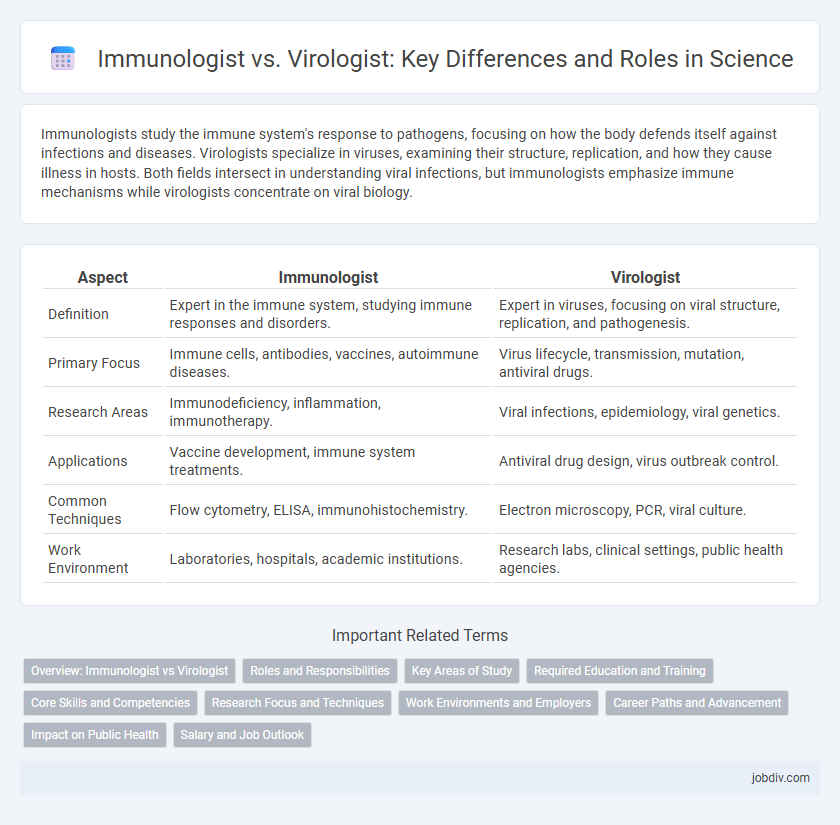Immunologists study the immune system's response to pathogens, focusing on how the body defends itself against infections and diseases. Virologists specialize in viruses, examining their structure, replication, and how they cause illness in hosts. Both fields intersect in understanding viral infections, but immunologists emphasize immune mechanisms while virologists concentrate on viral biology.
Table of Comparison
| Aspect | Immunologist | Virologist |
|---|---|---|
| Definition | Expert in the immune system, studying immune responses and disorders. | Expert in viruses, focusing on viral structure, replication, and pathogenesis. |
| Primary Focus | Immune cells, antibodies, vaccines, autoimmune diseases. | Virus lifecycle, transmission, mutation, antiviral drugs. |
| Research Areas | Immunodeficiency, inflammation, immunotherapy. | Viral infections, epidemiology, viral genetics. |
| Applications | Vaccine development, immune system treatments. | Antiviral drug design, virus outbreak control. |
| Common Techniques | Flow cytometry, ELISA, immunohistochemistry. | Electron microscopy, PCR, viral culture. |
| Work Environment | Laboratories, hospitals, academic institutions. | Research labs, clinical settings, public health agencies. |
Overview: Immunologist vs Virologist
Immunologists specialize in understanding the immune system's mechanisms, studying how the body defends itself against pathogens and disorders like autoimmune diseases. Virologists focus on viruses, researching their structure, replication, and the diseases they cause, including viral infections such as HIV, influenza, and COVID-19. Both fields intersect in vaccine development and infectious disease research, but immunologists primarily investigate immune responses while virologists concentrate on viral biology and behavior.
Roles and Responsibilities
Immunologists study the immune system's responses, mechanisms, and disorders, focusing on how the body defends against pathogens and maintains immunity. Virologists specialize in viruses, researching viral structure, replication, and interactions with host cells to develop vaccines and antiviral therapies. Both roles are critical in disease prevention and treatment, with immunologists emphasizing immune regulation and virologists concentrating on viral pathogenesis.
Key Areas of Study
Immunologists specialize in understanding the immune system's mechanisms, including immune responses, antibody production, and autoimmune diseases, while virologists focus on the structure, classification, and replication of viruses, as well as virus-host interactions. Immunologists study immunopathology, vaccine development, and immunotherapy, whereas virologists investigate viral genetics, pathogenesis, and antiviral drug design. Both fields intersect in research on viral infections, immune defense mechanisms, and the development of vaccines and treatments for infectious diseases.
Required Education and Training
Immunologists typically require a medical degree (MD) or a PhD in immunology or related fields, followed by specialized training through residencies or postdoctoral research focused on the immune system. Virologists often earn a PhD in microbiology, virology, or molecular biology, emphasizing extensive laboratory research and practical experience with viral agents during their doctoral and postdoctoral studies. Both careers demand rigorous scientific education and hands-on training to develop expertise in disease mechanisms and therapeutic development.
Core Skills and Competencies
Immunologists specialize in understanding the immune system's mechanisms, focusing on antigen recognition, immune response modulation, and autoimmune disorder identification. Virologists possess expertise in viral replication, pathogenesis, and molecular diagnostics, emphasizing virus-host interactions and viral epidemiology. Both disciplines require proficiency in molecular biology techniques, data analysis, and laboratory safety protocols to advance infectious disease research and therapeutic development.
Research Focus and Techniques
Immunologists primarily investigate the immune system's mechanisms, including antibody production, immune cell signaling, and immune response regulation, using techniques such as flow cytometry, ELISA, and immunohistochemistry. Virologists focus on viruses' lifecycle, pathogenesis, and virus-host interactions, employing methods like viral culture, PCR, next-generation sequencing, and electron microscopy. Both disciplines utilize molecular biology tools, but immunologists emphasize immune modulation, while virologists concentrate on viral replication and mutation dynamics.
Work Environments and Employers
Immunologists primarily work in research institutions, hospitals, and pharmaceutical companies, focusing on studying the immune system and developing treatments for immune-related diseases. Virologists are commonly employed by public health laboratories, academic institutions, and biotech firms, specializing in the study of viruses and viral infections to develop vaccines and antiviral drugs. Both professionals may also work for government agencies such as the CDC or NIH, conducting research and providing expertise on infectious disease control.
Career Paths and Advancement
Immunologists typically pursue careers in research institutions, hospitals, or pharmaceutical companies, focusing on understanding immune system mechanisms and developing therapies for autoimmune diseases and allergies. Virologists often work in laboratories, academia, or public health agencies, specializing in virus behavior, vaccine development, and outbreak control. Career advancement for both fields depends heavily on obtaining advanced degrees like PhDs or MDs and gaining postdoctoral research experience or specialized certifications in immunology or virology.
Impact on Public Health
Immunologists study the immune system's response to pathogens, developing vaccines and immunotherapies that enhance population immunity and prevent disease outbreaks. Virologists focus on understanding virus structure, replication, and transmission, enabling early detection and containment of viral epidemics. Together, their research underpins effective public health strategies for controlling infectious diseases and reducing morbidity and mortality worldwide.
Salary and Job Outlook
Immunologists typically earn an average salary ranging from $90,000 to $130,000 annually, reflecting demand in healthcare and research sectors, while virologists' salaries similarly range between $85,000 and $125,000 with variations based on industry and experience. Job outlook for immunologists projects growth of about 7% over the next decade due to increasing research on immune-related diseases, whereas virologists face a slightly higher demand with expected growth nearing 8%, driven by the ongoing need for viral outbreak investigation and vaccine development. Both fields offer robust career opportunities, but virologists often benefit from heightened visibility during global health crises, influencing salary competitiveness and employment stability.
Immunologist vs Virologist Infographic

 jobdiv.com
jobdiv.com